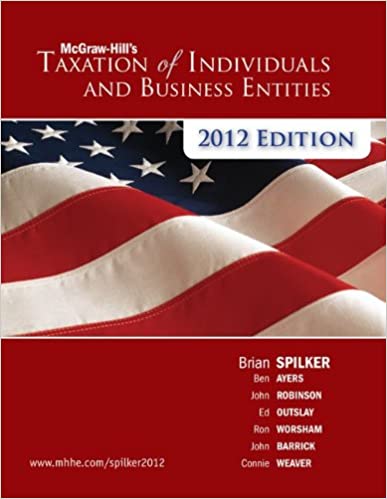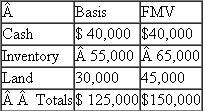
McGraw-Hill's Taxation of Individuals and Business Entities 3rd Edition by Brian Spilker, Benjamin Ayers, John Robinson, Edmund Outslay, Ronald Worsham, John Barrick, Connie Weaver
Edition 3ISBN: 9780078111068
McGraw-Hill's Taxation of Individuals and Business Entities 3rd Edition by Brian Spilker, Benjamin Ayers, John Robinson, Edmund Outslay, Ronald Worsham, John Barrick, Connie Weaver
Edition 3ISBN: 9780078111068 Exercise 42
Simon is a 30% partner in the SBD partnership, a calendar-year-end entity.As of the end of this year, Simon has an outside basis in his interest in SBD of $188,000, which includes his share of the $60,000 of partnership liabilities.On December 31, SBD makes a proportionate distribution of the following assets to Simon:  a.What are the tax consequences (amount and character of recognized gain or loss, basis in distributed assets) of the distribution to Simon if the distribution is an operating distribution?
a.What are the tax consequences (amount and character of recognized gain or loss, basis in distributed assets) of the distribution to Simon if the distribution is an operating distribution?
b.What are the tax consequences (amount and character of recognized gain or loss, basis in distributed assets) of the distribution to Simon if the distribution is a liquidating distribution?
c.Compare and contrast the results from parts a.and b.
 a.What are the tax consequences (amount and character of recognized gain or loss, basis in distributed assets) of the distribution to Simon if the distribution is an operating distribution?
a.What are the tax consequences (amount and character of recognized gain or loss, basis in distributed assets) of the distribution to Simon if the distribution is an operating distribution?b.What are the tax consequences (amount and character of recognized gain or loss, basis in distributed assets) of the distribution to Simon if the distribution is a liquidating distribution?
c.Compare and contrast the results from parts a.and b.
Explanation
In the current scenario of SBD Partnersh...
McGraw-Hill's Taxation of Individuals and Business Entities 3rd Edition by Brian Spilker, Benjamin Ayers, John Robinson, Edmund Outslay, Ronald Worsham, John Barrick, Connie Weaver
Why don’t you like this exercise?
Other Minimum 8 character and maximum 255 character
Character 255


